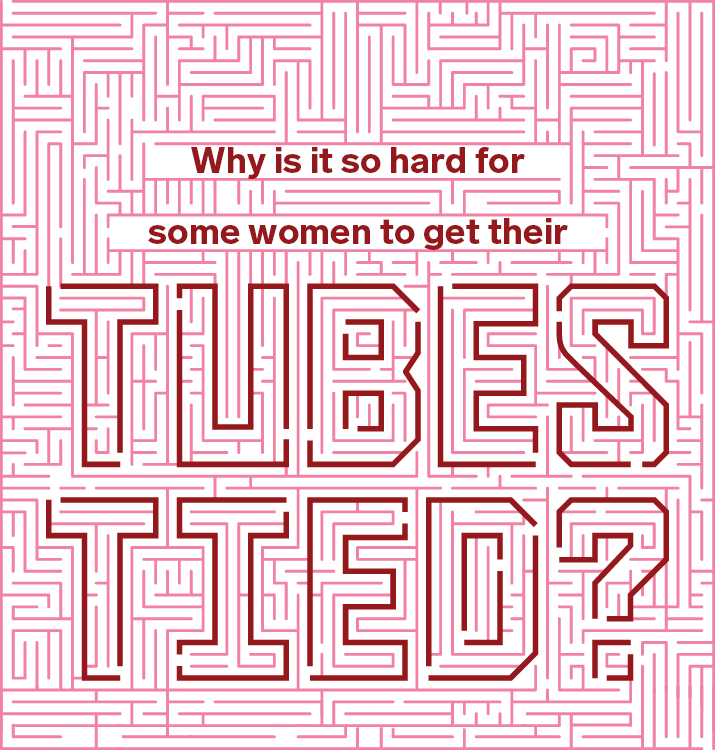Patronizing Mature Women
"[,,,Many women who desire sterilization at a young age experience barriers from physicians who decline to facilitate the request."
"...A woman who is child-free and wishes to remain so is less likely to regret sterilization than a mother who wants no additional children."
Drs. Dustin Costescu and Dylan Ehman, McMaster University Medical Centre, Hamilton
"It's unclear if this [chafing against the universal belief that women are meant to be mothers] is more women choosing to be child-free, or increased comfort in advocating [for sterilization]."
"Often these women have other role models in their life who are also child-free. They may be aunts or people in senior positions in their workplace -- role models who demonstrate they can meet all of their other life goals without having children."
Dr. Dustin Costescu, Family planning specialist
"I personally have zero worries about the risk of regret. I actually don't remember a time when I've had a parental instinct [other than with animals]."
"[I have experienced] the typical comments about how I'll change my mind, and that I'm 'too young to know what I want'. I've had doctors, all men, simply laugh off the situation and my concerns and tell me I'm not ready to make that decision [even though I have medical issues with my uterus and cervix]."
Anonymous 26-year-old woman awaiting tubal ligation at McMaster University Medical Centre
 |
| National Post |
The fact being that by the age of majority women in their 20s and 30s should be regarded as sufficiently mature to have of their own agency reached their own conclusions about whether they foresee childbearing in their future as a choice for them personally. To his great credit, however, Dr. Costescu will not refuse such requests, basing his position on the fact that he believes women approaching him to take advantage of his professional capabilities as a doctor, have every right for their requests to be honoured.
He and his colleague, Dr. Ehman, wrote their article in response to what they see as their professional colleagues in refusing to conduct sterilization procedures on women who request them with full consideration respecting the fall-out are doing these women an injustice. Those women who have convinced themselves for whatever reason that motherhood is not and never will be a goal that appeals to them have the right to due consideration, as far as these two doctors are concerned.
And Dr. Costescu, as a family planning specialist and assistant professor, states without equivocation that any woman seeking to permanently prevent pregnancy and with no contraindications or medical reasons that might complicate sterilization should be -- as he does himself -- considered an appropriate candidate for the procedure of sterilization.
Professional guidelines, in fact, clearly state that well-informed, mentally competent women knowledgeable of birth control options and the resulting "permanency of the procedure", should be respected in their wish for sterilization, irrespective of age or birth history. The two doctors reviewed medical records of 29 women under age 30 on a wait-list for sterilization at Dr. Costescu's clinic to find that most had reported their experience in previously seeking the process elsewhere as demeaning.
 |
| Illustration, Mikey Burton. Chatelaine |
Doctors consistently refused to perform the requested procedure, or would not refer the women to someone else in the profession who would provide sterilization for them. Among the women were some who related they were recommended the services of a psychiatrist to evaluate their requests, the implication being it is "pathological" to wish voluntarily to close out motherhood prospects for the future.
The surgery itself uses clips placed across the Fallopian tubes through laparocopic (minimally-invasive) laser surgery; alternately cutting away a part, or all of the tubes in their entirety, preventing the potential of a mature egg reaching the uterus to become fertilized. Fallopian tubes can be reopened, untied or reconnected with the traditional form of "tubal" ligation, though a reversal is no guarantee that pregnancy will ensue.
The study revealed that some of the women presented with medical conditions that could be risky for pregnancies while others had carried pregnancies to fruition and with children felt their families were complete and had no wish for additional offspring, while a third of the women studied had never gone through a pregnancy. Surgical risks in this generally safe and effective procedure include excess bleeding and infection with a complication rate of under two percent. Considered a minor surgery, it is performed under full anaesthetic.
A previous review undertaken in the United States involved over 11,000 women who'd received permanent sterilization in the 1970s and 80s, finding that fourteen years later the risk of regret was 20 percent in those 30 or younger at sterilization, and 6 percent for women over age 30. For women who had never had a child, compared with women who'd borne at least one, regret was lower.
As for the woman quoted above whose identity was not revealed on request, her partner is fully in support of her decision not to bear children. New Canadian guidelines recommend no restrictions on the basis of age, while according to Dr. Costescu, who had a hand in authoring the new guidelines, other doctors inform women in his practice they must await age 30 before they will be accommodated.
Labels: Canada, Childbirth, Family, Fertility, Health, Sterilization

0 Comments:
Post a Comment
<< Home